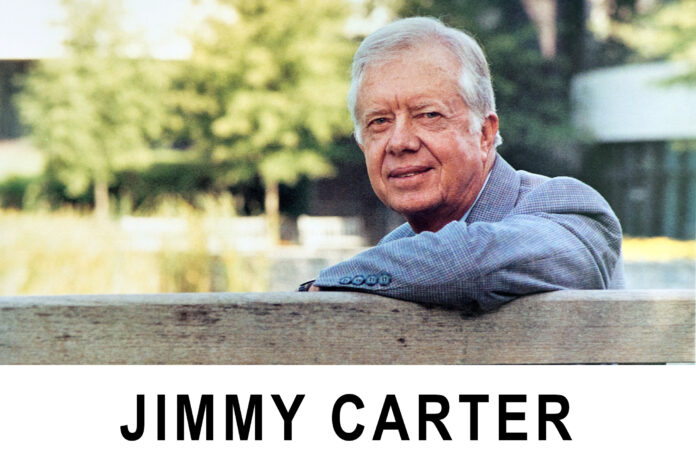PLAINS, GA — Jimmy Carter, the 39th President of the United States, passed away in his home in Plains, Georgia, on December 29, 2024, at the age of 100. A figure of profound impact both during his time in office and after, Carter leaves behind a legacy defined by a commitment to peace, human rights, and a tireless pursuit of service to others. His death marks the end of a remarkable life, and tomorrow, January 9, 2025, will be a National Day of Mourning, with a state funeral to honor his remarkable contributions to the United States and the world.
A Presidency Marked by Idealism and Struggles
Carter’s presidency (1977-1981) was characterized by his idealism, moral clarity, and dedication to addressing complex domestic and international challenges. He entered office with a pledge to restore faith in the U.S. government after the Watergate scandal, bringing a sense of integrity to the White House. However, his time in office was marked by significant hurdles that would later define his legacy.
One of Carter’s most enduring successes was his role in brokering the Camp David Accords in 1978. Through intense negotiation, he brought together Egyptian President Anwar Sadat and Israeli Prime Minister Menachem Begin, resulting in a peace agreement between Egypt and Israel — the first between Israel and any Arab nation. This diplomatic triumph earned Carter widespread acclaim and solidified his reputation as a peacemaker.
Carter also emphasized human rights as a cornerstone of his foreign policy, making human rights a priority in the United States’ diplomatic relations. This focus reshaped American foreign policy in the 1970s, especially in Latin America and Africa, where Carter advocated for greater political freedoms and support for democratic movements. His efforts were seen as a reaction against the prior administration’s focus on realpolitik.
Domestically, Carter pushed for energy reform in response to the ongoing energy crisis. His establishment of the Department of Energy and the passage of the National Energy Act in 1978 were significant steps toward reducing U.S. dependence on foreign oil. While his push for energy conservation was seen as forward-thinking, the economic pressures of high inflation, unemployment, and a sluggish economy overshadowed many of his domestic achievements.
Challenges and Setbacks
Despite these successes, Carter’s presidency was overshadowed by several crises that many historians cite as contributing to his struggles in office. The most significant of these was the Iran hostage crisis, which began in November 1979 when militants stormed the U.S. embassy in Tehran and took 52 American diplomats hostage. The failure to secure their release and the prolonged standoff, which lasted for 444 days, severely damaged Carter’s public image and led to a loss of support during the 1980 election.
Carter’s handling of the economy also became a point of contention. The combination of stagflation — a mix of high inflation and high unemployment — left Americans frustrated and disillusioned. His economic policies, including raising interest rates to curb inflation, were met with mixed results, and the economic malaise contributed to his eventual loss in the 1980 presidential election to Ronald Reagan.
Carter’s other attempts at domestic reform, including his efforts to create a national healthcare program and pass significant social welfare legislation, were often stymied by a deeply divided Congress and rising political polarization.
A Life of Service After the White House
While Carter’s presidency was seen as a period of mixed results, his post-presidential years became a testament to his character and commitment to service. After leaving office, Carter devoted himself to humanitarian causes and global health. In 1982, he founded the Carter Center, which became a platform for his lifelong commitment to promoting peace, human rights, and public health. The center’s efforts to eradicate guinea worm disease, its election monitoring in developing nations, and its work to promote democracy worldwide brought Carter widespread respect and admiration.
Carter’s work with Habitat for Humanity, a nonprofit dedicated to building homes for those in need, further exemplified his belief in service. In his later years, he became a hands-on volunteer, helping construct homes alongside other volunteers, showing the world that leadership and humility could go hand in hand.
In 2002, Carter was awarded the Nobel Peace Prize for his decades of work in promoting peace and resolving conflicts. The recognition was a testament to his tireless efforts to make the world a better place and cemented his status as one of the most respected former presidents in history.
A National Day of Mourning
As the world reflects on Jimmy Carter’s life and legacy, tomorrow, January 9, 2025, will be a National Day of Mourning in the United States. A state funeral will take place in Plains, Georgia, where the community that shaped him will honor his remarkable contributions. U.S. Presidents, world leaders, and figures from across the globe are expected to attend the ceremony to pay their respects to a man whose life was a testament to the power of service, integrity, and dedication to humanity.
Though his presidency faced significant challenges, Jimmy Carter’s life beyond the White House reshaped the way many viewed public service. His post-presidential contributions in humanitarianism, diplomacy, and global health established him as a model of service and kindness, far transcending the struggles of his political career.
Jimmy Carter leaves behind a legacy not just of political achievements, but of a life lived in dedication to the ideals of justice, compassion, and a better world for future generations. His passing marks the end of an era, but his influence will continue to resonate for years to come.

